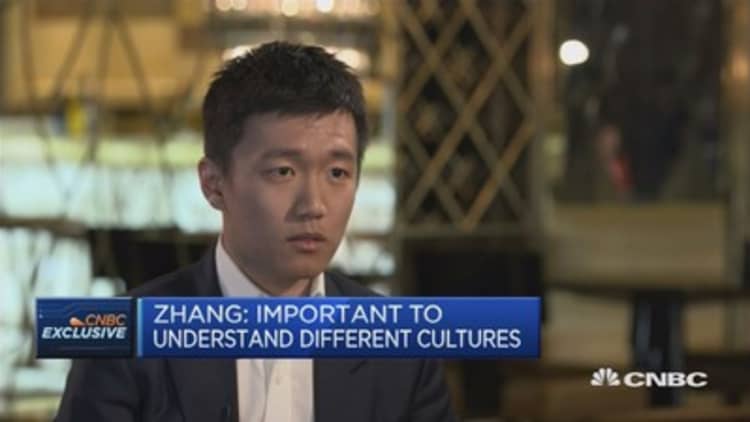
BEIJING — Things are changing so fast in today's world that companies need to stay on their toes to adapt and innovate to consumers' needs and wants, Suning Vice President Steven Zhang told CNBC.
It's impossible to predict what the world will look like a few years down the line, he said in a rare, exclusive interview. Even with today's e-commerce boom — long hailed as the end of brick-and-mortar stores — Zhang pointed to how customers still check out widgets in shops. Younger consumers, in particular, are looking for a more unique experience.
"Nobody can say in five years … what kind of way people want to shop," Zhang said. "We really need to [understand] our consumer, every second, and study them, and only providing services or things that they want, and be ready for it … what people want is the most important thing."
Suning had a humble start in 1990 distributing air conditioners, and has morphed since then into a retail giant both online and offline, operating 1,600 stores across 700 Chinese cities with a huge digital footprint. It's now China's second-largest private company, and has business in real estate, financial services, media and entertainment.
The Nanjing-based firm, founded by Zhang's father, Zhang Jindong, already owned a top Chinese football club when it made international headlines last year by sweeping up a 70 percent stake in illustrious Italian football club Inter Milan for about $300 million.
The company's international push fits well with China's "One Belt, One Road" foreign policy initiative, aimed at strengthening the country's links with the rest of the world. It also falls neatly in line with President Xi Jinping's ambitious plans for China to become a global football superpower.
In November, Zhang moved to Italy to oversee Inter Milan — an experience he says has underscored the necessity to adapt nimbly. "It's not only investing into a football club – it's really about how a company from China, or a company from one country goes out to another," he said.
Italy is "on the other side of the earth … so how [do we] really make people from here and there understand each other?" he said. "Inter, as one of the best football clubs in the world, really gave us this experience and open China to communicate with the world."
The team's less-than-stellar performance this season has disappointed fans, and Zhang is under no illusion about the responsibility that falls on his shoulders to turn things around. Even when on the road, he's following the team's ups and downs, watching games no matter what time of day.
Zhang said he sees it as the start of an opportunity to make his mark on the world — "a chance to change the world into a better place."
Though only 25, the University of Pennsylvania Wharton graduate has a big vision, driven to connect people on a human level in an increasingly tech-dominated world.
But it's a step-by-step process, and "listening and learning is always important," he said. "Learning not only from books, learning not only from words, but also learning from the experience — learning from reality."
Zhang is likely getting groomed to take over Suning someday. But for now, it's about connecting to Inter Milan fans and then taking that experience to reach out to the world.
"When you go into a stadium … You can really feel the passion, and feel the culture, and feel the heart of these people," Zhang said. We "want this football club [to] become a gate that opens cultures, opens trade, opens experiences."


